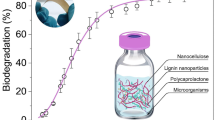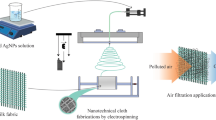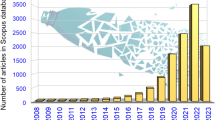Abstract
Due to natural agents and human activities, large quantities of microplastics enter the marine environment. As an emerging pollutant, MPs have attracted worldwide attention and become a great challenge in recent years. Sodium alginate is a kind of natural polysaccharide with non-toxic, stability, and low cost. In this study, sodium alginate sponge was prepared by secondary freeze-drying technology. Alginate sponge contains a large number of hydrophilic groups; thus, alginate sponge has super water-absorbed (the water absorption rate range from 1193–5232%). Meanwhile, the alginate sponge has high porosity of 81.93% and excellent mechanical properties. The removal efficiency of 100 mg·L−1 microplastics by alginate sponge reached up to 92.3%. The 1 mg·L−1 and 10 mg·L−1 microplastics can be completely absorbed in 27 h and 60 h, respectively. The adsorption mechanism of microplastics adsorbed onto alginate sponge included intra-particle diffusion, hydrogen bonds interactions, and π-π interactions. In addition, the adsorption of MPs loaded Cu2+/Na+ by sponge in complex aqueous environments is still significant. This study expands the development prospect of sodium alginate sponge materials in the field of water treatment and provides a new green approach for the removal of microplastics.
Graphical abstract










Similar content being viewed by others
Data availability
The datasets used in the current study are available from the corresponding author on reasonable request.
References
Abdurahman A, Cui K, Wu J, Li S, Gao R, Dai J, Liang W, Zeng F (2020) Adsorption of dissolved organic matter (DOM) on polystyrene microplastics in aquatic environments: kinetic, isotherm and site energy distribution analysis. Ecotoxicol Environ Safe 198:110658. https://doi.org/10.1016/j.ecoenv.2020.110658
Ahmadi Y, Ahmad S (2019) Surface-active antimicrobial and anticorrosive oleo-polyurethane/graphene oxide nanocomposite coatings: synergistic effects of in-situ polymerization and π-π interaction. Prog Org Coatings 127:168–180. https://doi.org/10.1016/j.porgcoat.2018.11.019
Ariza-Tarazona MC, Villarreal-Chiu JF, Barbieri V, Siligardi C, Cedillo-González EI (2019) New strategy for microplastic degradation: green photocatalysis using a protein-based porous N-TiO2 semiconductor. Ceram Int 45:9618–9624. https://doi.org/10.1016/j.ceramint.2018.10.208
Auta HS, Emenike CU, Fauziah SH (2017) Distribution and importance of microplastics in the marine environment: a review of the sources, fate, effects, and potential solutions. Environ Int 102:165–176. https://doi.org/10.1016/j.envint.2017.02.013
Batel A, Linti F, Scherer M, Erdinger L, Braunbeck T (2016) Transfer of benzo[a ]pyrene from microplastics to Artemia nauplii and further to zebrafish via a trophic food web experiment: CYP1A induction and visual tracking of persistent organic pollutants: trophic transfer of microplastics and associated POPs. Environ Toxicol Chem 35:1656–1666. https://doi.org/10.1002/etc.3361
Cheung WH, Szeto YS, McKay G (2007) Intraparticle diffusion processes during acid dye adsorption onto chitosan. Bioresour Technol 98:2897–2904. https://doi.org/10.1016/j.biortech.2006.09.045
Cui C, Zhao D, Huang J, Hao J (2022) Progress on research and development of goji berry drying: a review. Int J Food Prop 25:435–449. https://doi.org/10.1080/10942912.2022.2046054
Della Torre C, Bergami E, Salvati A, Faleri C, Cirino P, Dawson KA, Corsi I (2014) Accumulation and embryotoxicity of polystyrene nanoparticles at early stage of development of sea urchin embryos Paracentrotus lividus. Environ Sci Technol 48:12302–12311. https://doi.org/10.1021/es502569w
Eriksen M, Lebreton LCM, Carson HS, Thiel M, Moore CJ, Borerro JC, Galgani F, Ryan PG, Reisser J (2014) Plastic pollution in the world’s oceans: more than 5 trillion plastic pieces weighing over 250,000 tons afloat at sea. PLoS ONE 9:111913. https://doi.org/10.1371/journal.pone.0111913
Fan X, Zou Y, Geng N, Liu J, Hou J, Li D, Yang C, Li Y (2021) Investigation on the adsorption and desorption behaviors of antibiotics by degradable MPs with or without UV ageing process. J Hazard Mater 401:123363. https://doi.org/10.1016/j.jhazmat.2020.123363
Fan YV, Jiang P, Tan RR, Aviso KB, You F, Zhao X, Lee CT, Klemeš JJ (2022) Forecasting plastic waste generation and interventions for environmental hazard mitigation. J Hazard Mater 424:127330. https://doi.org/10.1016/j.jhazmat.2021.127330
Fu H, Chen J, Chen L, Zhu X, Chen Z, Qiu B, Lin Z, Guo L, Chen G (2019) A calcium alginate sponge with embedded gold nanoparticles as a flexible SERS substrate for direct analysis of pollutant dyes. Microchim Acta 186:64. https://doi.org/10.1007/s00604-018-3173-z
Gao R, Sun C (2021) A marine bacterial community capable of degrading poly(ethylene terephthalate) and polyethylene. J Hazard Mater 416:125928. https://doi.org/10.1016/j.jhazmat.2021.125928
Gao Q, Wang X, Wang H, Liang D, Zhang J, Li J (2019) Sulfhydryl-modified sodium alginate film for lead-ion adsorption. Mater Lett 254:149–153. https://doi.org/10.1016/j.matlet.2019.07.055
Geyer R, Jambeck JR, Law KL (2017) Production, use, and fate of all plastics ever made. Sci Adv 3:7. https://doi.org/10.1126/sciadv.1700782
Hecht H, Srebnik S (2016) Structural characterization of sodium alginate and calcium alginate. Biomacromolecules 17:2160–2167. https://doi.org/10.1021/acs.biomac.6b00378
Ho BT, Roberts TK, Lucas S (2018) An overview on biodegradation of polystyrene and modified polystyrene: the microbial approach. Crit Rev Biotechnol 38:308–320. https://doi.org/10.1080/07388551.2017.1355293
Jambeck JR, Geyer R, Wilcox C, Siegler TR, Perryman M, Andrady A, Narayan R, Law KL (2015) Plastic waste inputs from land into the ocean. Science 347:5. https://doi.org/10.1126/science.1260352
Li R, Wei C, Jiao M, Wang Y, Sun H (2022) Mangrove leaves: an undeniably important sink of MPs from tidal water and air. J Hazard Mater 426:128138. https://doi.org/10.1016/j.jhazmat.2021.128138
Liao J, Chen Q (2021) Biodegradable plastics in the air and soil environment: low degradation rate and high microplastics formation. J Hazard Mater 418:126329. https://doi.org/10.1016/j.jhazmat.2021.126329
Luo C, Guo A, Zhao Y, Sun X (2022) A high strength, low friction, and biocompatible hydrogel from PVA, chitosan and sodium alginate for articular cartilage. Carbohydr Polym 286:119268. https://doi.org/10.1016/j.carbpol.2022.119268
Luo Y, Xie H, Xu H, Zhou C, Wang P, Liu Z, Yang Y, Huang J, Wang C, Zhao X (2023) Wastewater treatment plant serves as a potentially controllable source of microplastic: association of microplastic removal and operational parameters and water quality data. J Hazard Mater 441:129974. https://doi.org/10.1016/j.jhazmat.2022.129974
Mani T, Blarer P, Storck FR, Pittroff M, Wernicke T, Burkhardt-Holm P (2019) Repeated detection of polystyrene microbeads in the Lower Rhine River. Environ Pollut 245:634–641. https://doi.org/10.1016/j.envpol.2018.11.036
Napper IE, Thompson RC (2016) Release of synthetic microplastic plastic fibres from domestic washing machines: effects of fabric type and washing conditions. Mar Pollut Bull 112:39–45. https://doi.org/10.1016/j.marpolbul.2016.09.025
Sun C, Wang Z, Zheng H, Chen L, Li F (2021) Biodegradable and re-usable sponge materials made from chitin for efficient removal of microplastics. J Hazard Mater 420:126599. https://doi.org/10.1016/j.jhazmat.2021.126599
Tang Y, Zhang S, Su Y, Wu D, Zhao Y, Xie B (2021) Removal of microplastics from aqueous solutions by magnetic carbon nanotubes. Chem Eng J 406:126804. https://doi.org/10.1016/j.cej.2020.126804
Xie H, Xia H, Huang L, Zhong Z, Ye Q, Zhang L, Lu A (2021) Biocompatible, antibacterial and anti-inflammatory zinc ion cross-linked quaternized cellulose-sodium alginate composite sponges for accelerated wound healing. Int J Biol Macromolec 191:27–39. https://doi.org/10.1016/j.ijbiomac.2021.09.047
Xu Z, Liu Y, Wu Z, Wang R, Wang Q, Li T, Zhang J, Cheng J, Yang Z, Chen S, Miao M, Zhang D (2020) Construction of extensible and flexible supercapacitors from covalent organic framework composite membrane electrode. Chem Eng J 387:124071. https://doi.org/10.1016/j.cej.2020.124071
Zhao X, Cornish K, Vodovotz Y (2020) Narrowing the gap for bioplastic use in food packaging: an update. Environ Sci Technol 54:4712–4732. https://doi.org/10.1021/acs.est.9b03755
Funding
This study was supported by the Special funds for Basic Scientific Research Business Expenses of Central Universities (22CX01004A-6), State Key Laboratory of Petroleum and Petrochemical Pollutant Control and Treatment Open Fund (PPC2019021, PPC2020015), and China Petroleum Science and Technology Innovation Fund Research Project (2018D-5007-0605).
Author information
Authors and Affiliations
Contributions
Ruojun Ma: conceptualization, methodology, data curation, formal analysis, and writing—original draft. Yongkang Feng: methodology, data curation, formal analysis, and writing—review and editing. Junlong Yu: formal analysis, supervision, and writing—review and editing. Xiaodong Zhao: formal analysis and writing—review and editing. Yi Du: supervision and writing—review and editing. Xiuxia Zhang: methodology, resources, supervision, funding acquisition, and writing—review and editing.
Corresponding author
Ethics declarations
Ethical approval
Not applicable.
Consent to participate
Not applicable.
Consent for publication
Not applicable.
Competing interests
The authors declare no competing interests.
Additional information
Responsible Editor: Tito Roberto Cadaval Jr
Publisher's Note
Springer Nature remains neutral with regard to jurisdictional claims in published maps and institutional affiliations.
Highlights
• Sodium alginate sponge was prepared by secondary freeze-drying technology.
• Intra-particle diffusion, the interactions of hydrogen bonds and π-π interactions were main forces.
• The sodium alginate sponge has high porosity and excellent absorption of water.
• The sponge showed good mechanical properties and adsorption capacity of microplastics.
Supplementary information
Below is the link to the electronic supplementary material.
Rights and permissions
Springer Nature or its licensor (e.g. a society or other partner) holds exclusive rights to this article under a publishing agreement with the author(s) or other rightsholder(s); author self-archiving of the accepted manuscript version of this article is solely governed by the terms of such publishing agreement and applicable law.
About this article
Cite this article
Ma, R., Feng, Y., Yu, J. et al. Ultralight sponge made from sodium alginate with processability and stability for efficient removal of microplastics. Environ Sci Pollut Res 30, 104135–104147 (2023). https://doi.org/10.1007/s11356-023-29740-x
Received:
Accepted:
Published:
Issue Date:
DOI: https://doi.org/10.1007/s11356-023-29740-x




